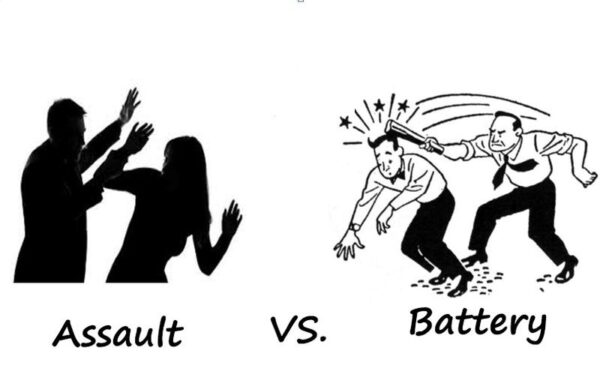
Assault and Battery are two independent legal concepts with characteristic elements. Assault is an attempt or threat to injure another person. At the same time, the assault will have actual contact with another person and be harmful or offensive.
In most states, assault or beating occurs when a person;
Attempting to hit or physically hit another person or
act threateningly to intimidate others in the face of immediate danger.
Other states state that a more severe assault or beating occurs when a person;
An attempt to cause or cause serious injury to another person and to cause injury by using a lethal weapon.
The notion of assault and Battery conjures up the typical picture of a fight or lawsuit; in some states, the two crimes are combined. However, the term has its differences and annoyances.
Assault and Battery may also be regulated by civil and not criminal law. For example, when there are personal wounds (torts).
Below is a more detailed look at the crimes, their specific characteristics, and when they are closely related.
Definition of Assault
The concept of assault as a crime varies depending on where the offense occurred. But it is generally defined as an attempt to injure another person, and in some circumstances, it may include threatening another person.
The broadest definition of assault is a deliberate attempt, by force or coercion, to injure or harm another person; or simple aggression.
And the main difference between assault and battery charges is that: there must be no contact to develop an attack, whereas there must be offensive or forbidden contact for an attack to occur.
Definition of battery charges
The laws that define assault also depend on the jurisdiction in which the crime was committed. The typical definition of assault is intentional, offensive, or harmful contact with someone without their consent.
Under this general definition, the crime of assault requires the presence of all of these elements:
- intentional contact,
- contact must be annoying or offensive,
- and there must be no consent from the victim.
Battery charges: requirement of intent
It may be a surprise that acts of aggression do not necessarily require an intention to hurt another person. To qualify a situation as an assault crime, one only needs to intend to make contact or cause contact with another person.
Also, if a person acts recklessly or negligently due to the contact, this may be an attack. For example, accidentally colliding with someone, no matter how offensive the affected party considers it, does not represent aggression.
How can an attorney help me with an assault or battery legal case?
In assault or battery cases, legal advice from an Oklahoma assault and battery attorney who knows criminal law is essential.
The definition and elements that can exacerbate this crime are precise. An Oklahoma assault and battery attorney can clarify the scope of the crime and the actions involved in your particular case.
If you have been assaulted or attacked and don’t know how to proceed against the assailant, you should seek legal assistance.
On the other hand, if you think you have committed the crime of assault or beating, you should know that there are many strategies to defend yourself against these accusations, especially when two or more people are involved in a heated exchange.
Suppose you know someone concerned about an assault or battery situation. In that case, it’s essential to contact a criminal law attorney as soon as possible to understand better the charges and the possible penalties that accompany such allegations.
